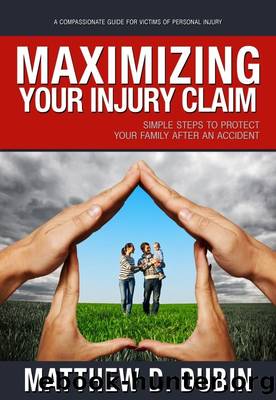Maximizing Your Injury Claim by Matthew D. Dubin

Author:Matthew D. Dubin [Matthew D. Dubin]
Language: eng
Format: epub
Tags: -
Publisher: Aviva Publishing
Published: 2015-05-29T00:00:00+00:00
THE RECORDED STATEMENT
Once you file a lawsuit, the third-party liability insurer, through its attorney, can require you to attend a deposition. I will address the deposition in a later chapter, but it is essentially an opportunity for the insurance companyâs attorney to ask you questions under oath. Except in very unusual circumstances, there is no right to a deposition before a lawsuit has been filed, but the insurance company can request a recorded statement, and it can make it a condition of settlement. While you have no legal obligation to cooperate or give a statement to the other personâs insurance, it is often in your best interest to do so, as long as you know what you are doing and you are represented by an attorney.
Very often, the liability insurer will attempt to contact you shortly after the accident to obtain a recorded statement. It will often tell you that such a statement is required, and that it will not move its investigation forward unless you agree to give a statement. I have heard horror stories from clients that insurance adjusters contacted them in their hospital rooms, shortly after surgery, when they are on high doses of pain medication and can barely think straight. I have seen other examples where the adjuster twists the injured personâs words, trying to shift fault for the accident or to minimize the injuries. This is a critical time in your claim, and you need to understand that the adjuster is aggressively looking for ways to reduce the compensation the insurance company will pay, even if he seems like he is being nice.
You should never, ever give a statement to the liability insurance company without an attorney unless you have decided to try to resolve the claim on your own. Even then, you need to make sure you are at your bestâfully alert and not distracted or impaired by pain, medication, or anything else. If you decide to give a statement, you should pay careful attention to the words the adjuster is using, and you should answer only the questions asked as precisely as you can.
Often when clients hire me, they have already given a statement to the insurance company. In those cases, I immediately get a copy of the statement and make sure everything that was said was accurate and that nothing can be misconstrued or taken out of context. Usually, nothing devastating is said in those statements, but sometimes, a misunderstanding needs to be corrected right away.
In one claim, my client Lauren Tibbs kept referring to the pain in her arm as a prior injury. She meant her arm was injured in the auto accident prior to the recorded statement, but her meaning was not clear. The claims adjuster took advantage of this misunderstanding and tried to make a record that the arm pain pre-existed the accident. Upon reviewing the recording and discussing it with Lauren, I was able to correct the record before it could do any harm.
The best recommendation I can
Download
This site does not store any files on its server. We only index and link to content provided by other sites. Please contact the content providers to delete copyright contents if any and email us, we'll remove relevant links or contents immediately.
| Air & Space | Construction |
| Disability | Educational Law & Legislation |
| Labor Law | Maritime |
| Military | Personal Injury |
| Sports |
Steroids: History, Science, and Issues by Standora Joan E.; Bogomolnik Alex; Slugocki Malgorzata(1196)
A Practical Guide to International Arbitration in London by Hilary Heilbron(1085)
Adrift by Steven Callahan(1035)
Reclaiming History by Vincent Bugliosi(1022)
Persuasion by Owner(1017)
The Nuremberg Interviews by Leon Goldensohn(991)
Dog Company: A True Story of American Soldiers Abandoned by Their High Command by Lynn Vincent & Roger Hill(980)
40 Days and 40 Nights by Matthew Chapman(970)
Poisoned by Jeff Benedict(961)
Last Narco by Beith Malcolm(937)
The New Whistleblower's Handbook by Stephen Kohn(922)
Introduction to the study and practice of law in a nutshell by Kenney F. Hegland(897)
Kafka's Last Trial by Benjamin Balint(850)
Lincoln's Code by John Fabian Witt(844)
A Passing Fury by A. T. Williams(827)
Japanese War Crimes during World War II: Atrocity and the Psychology of Collective Violence by Frank Jacob(812)
Eichmann in Jerusalem by Hannah Arendt(801)
Dog Company: A True Story of American Soldiers Abandoned by Their High Command by Roger Hill & Lynn Vincent(795)
A Court of Refuge by Ginger Lerner-Wren & Rebecca A. Eckland(787)
